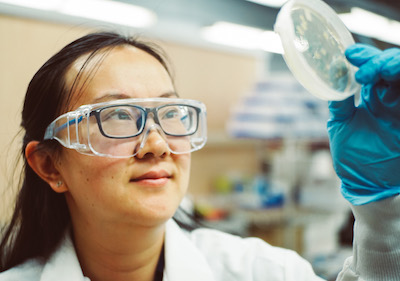As in other arid and semiarid parts of the world, water is a precious commodity in the southwestern United States. New Mexico State University civil engineering Assistant Professor Yanyan Zhang is working to evaluate if commonly used disinfection processes are effective in keeping the water supply pathogen-free and safe. Zhang recently received a three-year National Institutes of Health grant for this purpose.
Assistant Professor Yanyan Zhang, civil engineering, examines a petri dish containing bacteria from treated wastewater as part of her National Institutes of Health-funded research. (NMSU photo by Vladimir Avina.)
 Assistant Professor Yanyan Zhang, civil engineering, examines a petri dish containing bacteria from treated wastewater as part of her National Institutes of Health-funded research. (NMSU photo by Vladimir Avina.)“Bacterial pathogens in water pose a large world-wide threat to public health,” said Zhang. “In areas where water is scarce, we have to consider the use of treated water for drinking, irrigation, landscaping and so on. Disinfection is the last step before water is returned for these uses. It eventually returns to the water table.”
Assistant Professor Yanyan Zhang, civil engineering, examines a petri dish containing bacteria from treated wastewater as part of her National Institutes of Health-funded research. (NMSU photo by Vladimir Avina.)“Bacterial pathogens in water pose a large world-wide threat to public health,” said Zhang. “In areas where water is scarce, we have to consider the use of treated water for drinking, irrigation, landscaping and so on. Disinfection is the last step before water is returned for these uses. It eventually returns to the water table.”
Approximately 78 percent of New Mexicans depend on ground water for drinking water and some 81 percent are served by public systems with water derived from ground water sources. More than 170,000 New Mexicans depend on private wells for drinking water.
Widely used wastewater disinfection processes include chlorination, ozonation and UV radiation. While they are effective in removing most of the bacteria, such as E. coli and Salmonella, they do not completely eradicate the growth of microorganisms.
“Most studies have focused only on how many of the bacteria are removed,” said Zhang. “Few studies have focused on what happens with the remaining bacteria. Surviving microorganisms after disinfection are the main risk and they can be environmentally transmitted to humans through potable reuse, agriculture irrigation and groundwater recharge.”
Zhang will examine water samples pre- and post-disinfection from three full-scale water reclamation plants in El Paso where treated water is reused for irrigation, groundwater recharge and surface water augmentation. Her goal is to determine the effect of various treatment processes on the surviving microbes.
She will examine the behavior and abundance of the microbial population in raw water and water that has been treated, seeking information as to whether they become more hazardous to human health as a result of treatment. She will also investigate the possibility that they become “super bugs” with increased resistance to antibiotic treatment.
“Preliminary studies show that low doses of disinfection increase the number of antibiotic resistant bacteria,” she said. “The bacteria can develop a small piece of genes that encode resistance to antibiotics and can spread to other cells.”
Another issue is that the bacteria can form the biofilm that makes it adhere to surfaces, such as pipes. It is interesting to find the biofilm is thicker and more difficult to remove after disinfection under some conditions.
The ultimate goal is to use the findings of this research on the effects of disinfection processes on the virulence and antibiotic resistance of water-borne pathogens to provide guidance regarding disinfection strategies in water purification, food industry and even medical devices.
Zhang, an NMSU faculty member of only two years, has a strong background in water treatment applications in pathogen removal from her graduate studies at the University of Missouri and a postdoctoral appointment at the University of Alberta, Canada. In 2017, she was selected to participate in the National Institutes of Health-funded Big Data to Knowledge (BD2K) Data Science Innovation Lab for new interdisciplinary collaborations in microbiome big data analysis with mathematicians, statisticians and biomedical scientists.
Mentoring Zhang is Geoffrey Smith, NMSU professor of biology and an established environmental microbiology researcher. Smith has conducted extensive studies to understand how long microbial pathogens are harbored in environmental reservoirs in-between disease outbreaks, and to develop new techniques to detect environmental bioagents.
One of Zhang’s long-term goals is to establish and maintain an interdisciplinary research team at NMSU to develop effective approaches to reduce the microbial risks in reclaimed water for its
safe reuse in different applications. She currently has one graduate student working with her on this research and plans to hire another.


